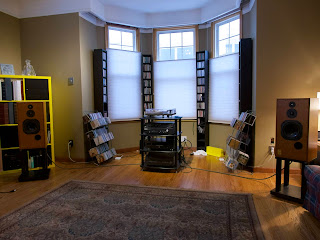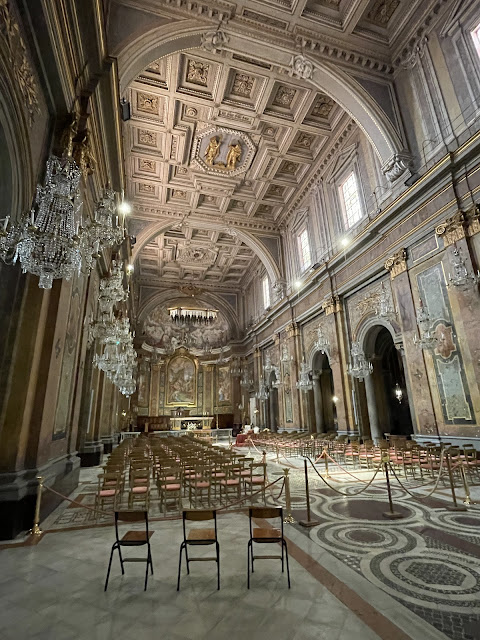The Latest Trolling at the Music Shop
Recently I wandered into one of the major music and media sellers in a large local shopping mall. The weather was really hot and I, like many others, sought refuge in the artificially cooled air of the mall. I stopped in at the "Apple" store. It was crowded and casually interactive in the sort of way that is projected in the ads.
A little later I wafted down one of the hallways of the mall and stopped in at the media retailer I mentioned. It was almost empty despite stocking music, videos, emblazoned hoodies and T-shirts, music player paraphernalia, video games and a new aggressive loyalty program.
The clear answer was that the download now reigns. This is really a return to the era of the single, rather than the album.
I have spent time browsing iTunes. Visually it does not provide the amount of information that a visit to a physical outlet does, but it is focused. You can find what you already want very quickly and the computer is very good at showing you other things you might be interested in. It isn't very good, however, if your tastes happen to be pretty diverse or if you want to discover something new.
That's what I enjoy the most about "trolling" for music in a physical store. You often do walk out with something you hadn't been thinking about at all when you went in and these finds can turn out to be the best.
On this trek I walked out with a fairly eclectic disc of music by the French baroque court composer Marc Antoine Charpentier, and a package of the CD and DVD of the original "Three Tenors" Concert given at the Baths of Caracalla in Rome in 1990 during the World Cup that was then taking place in Italy and two discs of movie music.
The Three Tenors disc was great. This concert occurred in the evening of the opera stage careers of Luciano Pavarotti and Placido Domingo. The third singer, Jose Carreras was still relatively young. Carreras demonstrates the most delicate voice of the three. Domingo as I have alluded to already has really been the whole package, solid voice, sensible musical discipline and good acting skills. Pavarotti, however, in this concert was really in his element not only because the concert took place in Italy but because it was a pops concert where he could let loose. Listening again to this concert reawakened for me the recognition of Pavarotti's raw talent. Long before Paul Potts, Pavarotti literally brought the house of 6,000 spectators down with his rendering of "Nessun Dorma", from Puccini's final opera, "Turandot". For the encore I switched from the CD (better sound quality) to the DVD. All three singers, Zubin Mehta, the conductor and the whole orchestra are so clearly having fun. It is not often that you describe classical music as fun, but this concert is truly a landmark in fun in classical music.
The two movie discs were biopics of the jazz age composer Cole Porter and the great French chanteuse Edith Piaf. The musical approaches of the two discs are very different. While stylistically paying attention to the era of the music, the Porter disc uses contemporary singers like Alanis Morisette and Elvis Costello singing in the way you would expect them to. The Piaf disc uses carefully remastered recordings of the chanteuse herself, new music composed to complement the Piaf material and a contemporary singer providing new recordings done in the Piaf style. The latter is more faithful than the former but each shows the vitality of the musicians they honour and of the times they lived in.
Piaf's life was very difficult and she lived in difficult times, through the Second World War. Porter lived and composed in the years following the First World War. There's a French connection. He lived in Paris for a while.
The music of both of them speaks of a certain quota of decadence and consequent ennui. Porter's music, however, is more deliciously indulgent. Piaf's singing carries the tinge always of burdens borne.

The passions that are celebrated and sometimes painfully acknowledged in the music of both comprise a secular response to what would otherwise seem hopeless and depressing -- a world gone mad. The First World War saw senseless killing on a scale that had never happened before. Empires fell. Monarchies were toppled. Lives and the means of making a living were shattered. The great influenza epidemic of 1918 killed even more people worldwide than the war had.
And yet the 1920's emerged as a decade of relative prosperity for those left behind, but also a time when the old frameworks for understanding and interpreting one's life experiences had been upended.
When war broke out again this madness returned and with a vengeance and spitefulness that people had pretended was not present.
This is one reason the spiritual life is not about only one's own soul. It is also about how those who listen to the soul whom God is constantly addressing, in turn address the sorrows and challenges of the world in which all souls live and die.
After self-indulgence and ennui, just as after war and injustice, must come reconciliation and peace. Dona nobis pacem.
And so, while we enjoy the convenience of the computer sorting and suggesting, and while we live with our own preferences and likes, it is good to go out into the public square, the real one, where we rub up against something new that takes us to new places by telling us stories we haven't heard before. This is the virtue of the physical encounter at the store and the merit of an album that presents a story of some span of an artist's work.
A little later I wafted down one of the hallways of the mall and stopped in at the media retailer I mentioned. It was almost empty despite stocking music, videos, emblazoned hoodies and T-shirts, music player paraphernalia, video games and a new aggressive loyalty program.
The clear answer was that the download now reigns. This is really a return to the era of the single, rather than the album.
I have spent time browsing iTunes. Visually it does not provide the amount of information that a visit to a physical outlet does, but it is focused. You can find what you already want very quickly and the computer is very good at showing you other things you might be interested in. It isn't very good, however, if your tastes happen to be pretty diverse or if you want to discover something new.
That's what I enjoy the most about "trolling" for music in a physical store. You often do walk out with something you hadn't been thinking about at all when you went in and these finds can turn out to be the best.
On this trek I walked out with a fairly eclectic disc of music by the French baroque court composer Marc Antoine Charpentier, and a package of the CD and DVD of the original "Three Tenors" Concert given at the Baths of Caracalla in Rome in 1990 during the World Cup that was then taking place in Italy and two discs of movie music.
The Three Tenors disc was great. This concert occurred in the evening of the opera stage careers of Luciano Pavarotti and Placido Domingo. The third singer, Jose Carreras was still relatively young. Carreras demonstrates the most delicate voice of the three. Domingo as I have alluded to already has really been the whole package, solid voice, sensible musical discipline and good acting skills. Pavarotti, however, in this concert was really in his element not only because the concert took place in Italy but because it was a pops concert where he could let loose. Listening again to this concert reawakened for me the recognition of Pavarotti's raw talent. Long before Paul Potts, Pavarotti literally brought the house of 6,000 spectators down with his rendering of "Nessun Dorma", from Puccini's final opera, "Turandot". For the encore I switched from the CD (better sound quality) to the DVD. All three singers, Zubin Mehta, the conductor and the whole orchestra are so clearly having fun. It is not often that you describe classical music as fun, but this concert is truly a landmark in fun in classical music.
The two movie discs were biopics of the jazz age composer Cole Porter and the great French chanteuse Edith Piaf. The musical approaches of the two discs are very different. While stylistically paying attention to the era of the music, the Porter disc uses contemporary singers like Alanis Morisette and Elvis Costello singing in the way you would expect them to. The Piaf disc uses carefully remastered recordings of the chanteuse herself, new music composed to complement the Piaf material and a contemporary singer providing new recordings done in the Piaf style. The latter is more faithful than the former but each shows the vitality of the musicians they honour and of the times they lived in.
Piaf's life was very difficult and she lived in difficult times, through the Second World War. Porter lived and composed in the years following the First World War. There's a French connection. He lived in Paris for a while.
The music of both of them speaks of a certain quota of decadence and consequent ennui. Porter's music, however, is more deliciously indulgent. Piaf's singing carries the tinge always of burdens borne.

The passions that are celebrated and sometimes painfully acknowledged in the music of both comprise a secular response to what would otherwise seem hopeless and depressing -- a world gone mad. The First World War saw senseless killing on a scale that had never happened before. Empires fell. Monarchies were toppled. Lives and the means of making a living were shattered. The great influenza epidemic of 1918 killed even more people worldwide than the war had.
And yet the 1920's emerged as a decade of relative prosperity for those left behind, but also a time when the old frameworks for understanding and interpreting one's life experiences had been upended.
When war broke out again this madness returned and with a vengeance and spitefulness that people had pretended was not present.
This is one reason the spiritual life is not about only one's own soul. It is also about how those who listen to the soul whom God is constantly addressing, in turn address the sorrows and challenges of the world in which all souls live and die.
After self-indulgence and ennui, just as after war and injustice, must come reconciliation and peace. Dona nobis pacem.
And so, while we enjoy the convenience of the computer sorting and suggesting, and while we live with our own preferences and likes, it is good to go out into the public square, the real one, where we rub up against something new that takes us to new places by telling us stories we haven't heard before. This is the virtue of the physical encounter at the store and the merit of an album that presents a story of some span of an artist's work.



